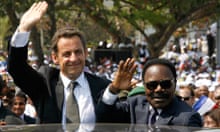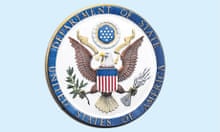@garyjbyrnes asked about Shell's pipeline off the west coast of Ireland
A senior figure in Shell said that there could be dozens of gasfields similar to a major one off Ireland's west coast that has become the focus of a bitter battle with local people, according to a cable from the US embassy in Dublin.
It reported that Julian Cetti, Shell Ireland's head of commercial and business strategy, had said Shell's highly lucrative Corrib gas field and another facility planned in the Shannon area by the US oil firm Hess would be enough to meet Ireland's domestic gas demand for many years.
"Shell's Cetti said there 'could be 20 or more Corribs out there – or very little – depending on how the exploratory drilling progresses this year'," said the cable, sent in April 2008 from the US embassy in Dublin and marked confidential.
But it also added that Cetti had "hinted" the energy company had no "Plan B" if it failed to win approval for a controversial pipeline to bring gas in from the Corrib gas refinery near Rossport in County Mayo.
An Irish planning appeals board began hearings in August this year into a revised route for the pipeline, which opponents claim is unsafe.
The same cable noted: "Ireland is blessed with some of the best wind and ocean energy resources in the world, and the government is beginning to focus efforts on promoting these sources of energy".
But it concluded that "a strong sense of urgency" was lacking in Irish efforts to tackle environment and energy concerns, including climate change and energy security.
While noting some incentives to "jump start" the renewable energy sector, it went on to add that Sara White, the deputy secretary general in Ireland's communications, energy, and natural resources department, believed "that technological developments will drive solutions to global warming".
White also "thought that Ireland really needs to focus on a very small set of initiatives in which it can play a significant role".
"She saw no value in 'stretching ourselves too thin' and said that the government 'is taking a bit of a punt on ocean energy development'."
Another figure also listed as a contact by the embassy, Padraig McManus, the chief of Ireland's semi state-owned Electricity Supply Board, as saying "that Irish business will end up just 'buying the best technology' in areas like clean coal and carbon sequestration".
Quoting another contact, the assistant secretary at the Irish department of the environment and local government, it added: "Part of the problem is that, as Tom O'Mahony said, the Irish populace has not 'internalised the costs of global warming', so there is no sense of urgency to move on the issue." Ben Quinn
Emails asked for more on the extradition of Christopher "Dudus" Coke from Jamaica
The mayor of Kingston, Jamaica, tried to dissuade the US government from extraditing a local druglord because he correctly predicted it would ignite violence and unleash a challenge to the state, according to statements attributed to the mayor within leaked US diplomatic cables.
Councillor Desmond McKenzie, mayor of Kingston and St Andrew, allegedly told US officials in September 2009 that the Americans' request to extradite Christopher "Dudus" Coke on narcotics and firearms charges risked "serious repercussions" and would "risk destroying everything the government was trying to do on the economy and crime".
When Jamaican officials eventually tried to arrest Coke in May 2010 violence did indeed break out between gangs loyal to the druglord and state forces. At least 73 people were killed as the government declared a state of emergency. Coke was eventually captured and extradited in June.
The mayor also allegedly told diplomats Coke had collaborated with the Jamaican government in various crime crackdowns. The confidential cable states: "The mayor said that in recent years his administration had worked with Coke to reduce crime in the inner cities of Jamaica, particularly in West Kingston. If he now were extradited this would 'leave a vacuum', and matters would be much worse."
The cable continues: "McKenzie noted that in recent days several of his "contacts in the communities" had told him they "would not take this [Coke's extradition] lying down".
A further cable claims Lorna Golding, the Jamaican prime minister's wife, told a US embassy official that the extradition request "had been orchestrated as a means of embarrassing her husband politically" by people – including US congressman Charles Rangel – sympathetic to her husband's political enemies.
The cable states: "In an often surreal and disjointed conversation, Mrs Golding alleged that Congressman Rangel is a 'sympathiser' of the opposition People's National party (PNP) who is 'manipulated' by PNP elements in the Jamaican diaspora in the US and is 'whispering in secretary Clinton's ear' in order to 'downgrade' the governing Jamaica Labour Party (JLP) and the government of Jamaica." Patrick Kingsley
Numerous tweets requested information on the Anti-Counterfeiting Trade Agreement
The Anti-Counterfeiting Trade Agreement (Acta) is very much a WikiLeaks story. The site published a leaked discussion paper from the closed-door negotiations in July 2008 when the secrecy surrounding the proposals on piracy and other intellectual property issues from the US, Japan, EU, Canada and some others (but not China) meant very little was known of it.
So what do the cables say? Well, that the lack of transparency was a problem for some of the participants, too. A November 2008 cable from the Rome embassy reports that Fabrizio Mazza, head of the intellectual property office in the Italian foreign ministry, told US diplomats that the level of confidentiality attached to the negotiations made it "impossible for member states to conduct necessary consultations with IPR [intellectual property rights] stakeholders and legislatures". The cable stated that the "level of confidentiality in these Acta negotiations has been set at a higher level than is customary for non-security agreements".
A cable a year later from the Stockholm embassy detailed how the problems negotiators had with secrecy were becoming an issue for politicians, too.
Swedish media and the usual blogger-circles have expressed similar concerns about the on-going Acta (Anti-Counterfeiting Trade Agreement) negotiations as we have seen in many other countries, mostly focusing on the secrecy and the internet chapter with its reported demands for graduated response systems. As the Swedish justice ministry has negotiating for the EU during the second half of this year, this has led to domestic criticism of the government. Media reporting has forced the Swedish government to go public saying that Sweden will not agree to Acta provisions requiring revised Swedish laws.
According to the cable, the Swede negotiating for the EU, Stefan Johansson, told US diplomats that "the refusal to make Acta documents public has been an excellent political tool around which to build speculation about the political intent behind the negotiations". It adds that Johansson told them there was strong support within the negotiating group that a negotiated text "must be made public while there is still scope to influence the final outcome" while the European commission was concerned that while the US government had consulted with US industry, it had not been able to do the same.
A first public draft of the Acta was published in April this year, with a final version following in November. Simon Jeffery




Comments (…)
Sign in or create your Guardian account to join the discussion